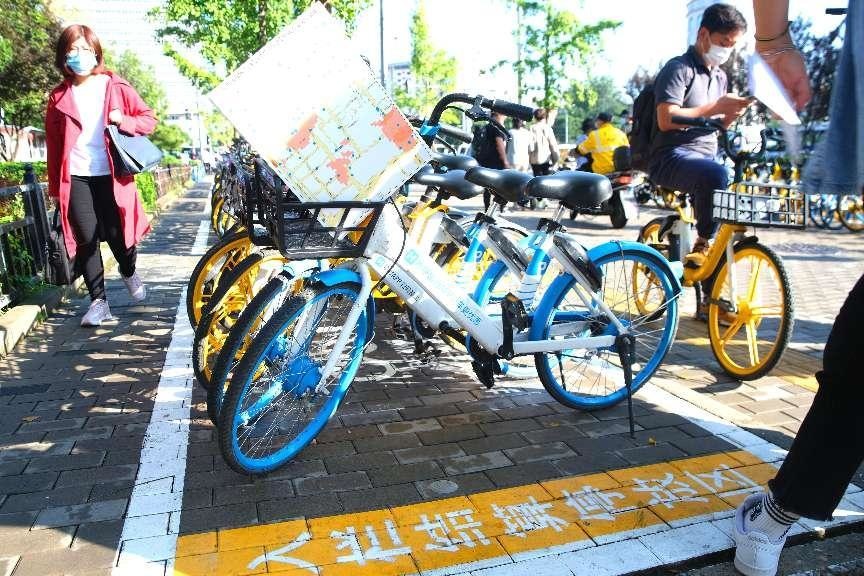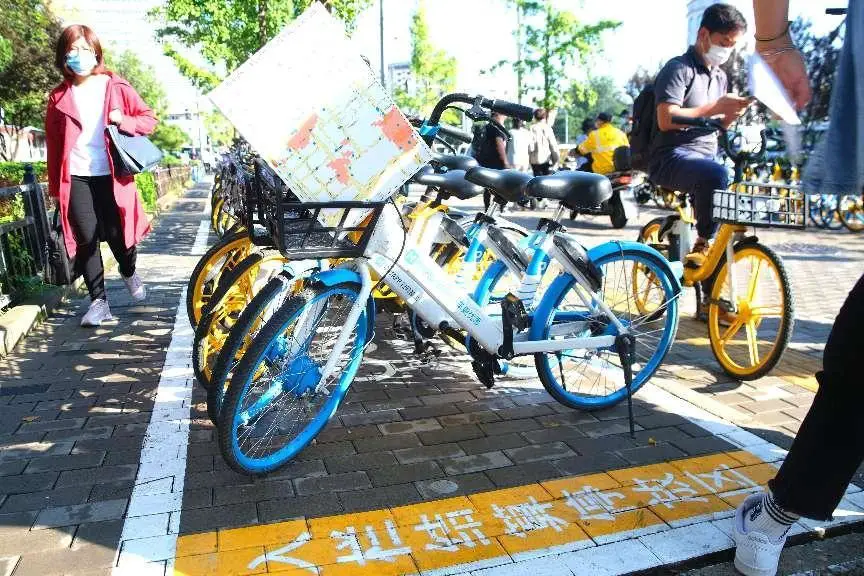By Wang Junling, Jiao Siyu

Photo taken on Sept. 27, 2021 shows shared bikes outside the Chongwenmen subway station in Dongcheng district, Beijing. (Photo by Guo Junfeng/People's Daily Online)
Green consumption is a form of consumption during which consumers fully take environmentally friendly behaviors. At present, a green, low-carbon and environment-friendly consumption philosophy is gradually rising in China.
Zhang Kai from Zhengzhou, capital of central China's Henan province has just had his new apartment decorated and furnished. According to him, energy conservation was a primary consideration for him when he bought home appliances.
Though energy-saving models were a bit more expensive, they were more economical in the long run and could contribute more to environmental protection, the man said.
Jiao Duoduo, who is currently studying in a university in Beijing, said green consumption is also important in the transportation sector. She usually takes public transport or shared bikes when she gets around, Jiao told People's Daily.
Green consumption is a profound reform that concerns the green and low-carbon transition in production and daily life.
According to an action plan recently issued by the Chinese government to promote green consumption, by 2025, the philosophy of green consumption will be made popular in the country, and green and low-carbon products will enjoy a larger market share. Besides, green consumption will be a conscious choice of the public and green and low-carbon products mainstreamed by 2030.
Green consumption can drive relevant enterprises to improve their ability in green innovation, spurring them to develop and introduce advanced and appropriate green and low-carbon technologies to expand the supply of green products.
Wu Jiong from northwest China's Gansu province recently found that plastic bags were more and more replaced by paper sacks and degradable cloth packages, and plastic straws used by bubble tea shops were also disappearing.
As a matter of fact, many Chinese enterprises have already been targeting at green consumption. Some of them focus on material conversion that turns waste into things of value. For instance, Bottloop, a sustainable lifestyle brand based in Beijing, is producing T-shirts, hoodies, UV protection jackets and raincoats out of recycled plastics and cotton fibers. These products are not only fashionable, but also breathable, quick-drying, UV-resistant and waterproof, said Zhang Xiaoxiao, a business manager of the brand.
Besides, some Chinese enterprises are working to make the most of resources through e-commerce platforms. As an online C2C flea market, Xianyu has become sensational in China over the recent years, where consumers can buy, sell and freecycle. It keeps the circulation of unused stuffs.
According to an executive of the platform, Xianyu has gained more than 300 million users so far, and over a billion products are being put on the shelf on the platform each year. To turn the behavior of wasting into consuming is a consensus of Xianyu users, the executive said.
This year, Xianyu will set up a system that allows users to redeem their credits gained through green consumption, and launch AI authentication for multiple categories of products to lower the threshold for used goods authentication and enhance the circulation efficiency of unused stuffs.
Zhang Kai from Zhengzhou, capital of central China's Henan province has just had his new apartment decorated and furnished. According to him, energy conservation was a primary consideration for him when he bought home appliances.
Though energy-saving models were a bit more expensive, they were more economical in the long run and could contribute more to environmental protection, the man said.
Jiao Duoduo, who is currently studying in a university in Beijing, said green consumption is also important in the transportation sector. She usually takes public transport or shared bikes when she gets around, Jiao told People's Daily.
Green consumption is a profound reform that concerns the green and low-carbon transition in production and daily life.
According to an action plan recently issued by the Chinese government to promote green consumption, by 2025, the philosophy of green consumption will be made popular in the country, and green and low-carbon products will enjoy a larger market share. Besides, green consumption will be a conscious choice of the public and green and low-carbon products mainstreamed by 2030.
Green consumption can drive relevant enterprises to improve their ability in green innovation, spurring them to develop and introduce advanced and appropriate green and low-carbon technologies to expand the supply of green products.
Wu Jiong from northwest China's Gansu province recently found that plastic bags were more and more replaced by paper sacks and degradable cloth packages, and plastic straws used by bubble tea shops were also disappearing.
As a matter of fact, many Chinese enterprises have already been targeting at green consumption. Some of them focus on material conversion that turns waste into things of value. For instance, Bottloop, a sustainable lifestyle brand based in Beijing, is producing T-shirts, hoodies, UV protection jackets and raincoats out of recycled plastics and cotton fibers. These products are not only fashionable, but also breathable, quick-drying, UV-resistant and waterproof, said Zhang Xiaoxiao, a business manager of the brand.
Besides, some Chinese enterprises are working to make the most of resources through e-commerce platforms. As an online C2C flea market, Xianyu has become sensational in China over the recent years, where consumers can buy, sell and freecycle. It keeps the circulation of unused stuffs.
According to an executive of the platform, Xianyu has gained more than 300 million users so far, and over a billion products are being put on the shelf on the platform each year. To turn the behavior of wasting into consuming is a consensus of Xianyu users, the executive said.
This year, Xianyu will set up a system that allows users to redeem their credits gained through green consumption, and launch AI authentication for multiple categories of products to lower the threshold for used goods authentication and enhance the circulation efficiency of unused stuffs.
 Menu
Menu
 China accelerates steps to promote green consumption
China accelerates steps to promote green consumption
















